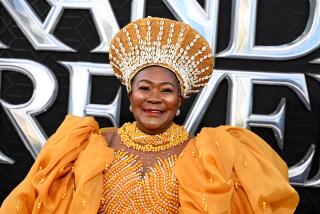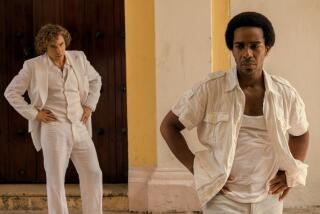Older and Graying, Former Black Panthers Mellow but Cling to Ideals : Civil rights: Bobby Seale forms organization for young people in Philadelphia. Elaine Brown hopes to build a South Central Los Angeles school where youths can learn to be ‘enterprising human beings.’
OAKLAND--They are older, grayer. They no longer seek power in the barrel of a gun, and most left the organization long ago.
But one thing has not changed in the nearly 30 years since they arose from the mean streets of Oakland: The men and women who once led the Black Panthers still believe in bringing “All Power to All People.”
And though many former Panther leaders aren’t interested in reviving the militant party of the past--the Panthers are now just a service organization in Oakland--they lament that the social work they began remains unfinished.
“I’m frustrated many times and find it very depressing that there seems not to be any real voice for the underclass,” said former Panthers Chief of Staff David Hilliard, 51. “The only thing people seem to get together around for today is a rock concert. . . .”
“It’s not 50-year-old revolutionaries and ex-Panthers who bring about change. It’s youth who bring about change.”
But the old Panthers try. Bobby Seale, who co-founded the group with Huey P. Newton in 1966, lectures 40 times a year and has established a nonprofit organization in Philadelphia to teach youth how to organize communities.
Elaine Brown hopes to build a school in South Central Los Angeles, to teach poor kids to be “enterprising human beings who will have something to do other than hope and wait for someone else to change the world.”
“I have a personal interest in them because I was them. I know what that feels like when the world doesn’t care whether you live or die tomorrow,” she said in a telephone interview from her home in Paris.
Brown grew up in Philadelphia, where her deepest desire was to be white. But then the Panthers came along, with their resounding call for social revolt. Malcolm X had been assassinated and the civil rights movement was losing steam.
The Panthers, Brown said, “gave me a sense of my value as a human being.” She was with the Panthers for several years and served as the party’s leader while Newton was in exile in Cuba.
“Our organization is really no different from other civil rights organizations,” said Seale, 57. “The only difference is we believed in the right to self-defense.”
In all, 28 party members and 14 police officers died in various Panther-police conflicts.
Seale says times have changed: “There’s nothing wrong with being a cop. There’s nothing wrong with being a white person. It’s about where your heart is. . . . We’ve got to get everyone beyond the xenophobic isolationism.”
But in those days, the Panthers were ready to fight. And, eventually, they fell to fighting themselves.
Eldridge Cleaver, author of “Soul On Ice” and Panther information minister, fought with Newton. He was banned while in exile and tried to form a rival party. After a shootout with police, he jumped bail in 1968 and fled to Cuba, Algeria, the Soviet Union, France and elsewhere.
Cleaver returned to the United States in 1975, renounced the Panthers and became a born-again Christian and a Republican. He continues to recover from a brain hemorrhage he suffered March 1.
Seale resigned from the Panthers in 1974, as it dwindled from a high of 5,000 members, two-thirds of whom were women, to a few hundred.
“Huey had just degenerated into abusing drugs. . . . I know that half the reason of the party’s demise was his fault,” Seale said. He said the FBI’s successful efforts to create internal strife could be blamed for the rest.
The Panther co-founders, who had made a pact to always “back each other up,” last spoke in 1985. “He apologized for everything he did wrong,” Seale said. After that, “I had nothing to say to Huey any more.”
Newton was shot to death Aug. 22, 1989, in West Oakland. Tyrone Robinson said he shot Newton in self-defense over a drug debt. Prosecutors argued that Robinson was trying to gain status in a prison gang.
No one expected Newton to die any other way.
“I was only surprised that it took so long,” Brown said.
She quit the Panthers in the late ‘70s. “I knew that I was making a choice between bad and worse. I wasn’t sure which one was which. My survival instincts told me it was time to get out.”
Still, she mourns the death of the party.
“It’s as if after the Black Panther Party, life went on hold in Oakland,” said Brown, 50. “I had tried so hard to make that one city a kind of jewel of hope in America. It is in fact kind of despairing right now.”
Hilliard, who was banned from the party in 1973, expects a new movement to rise in its place.
“I don’t know what it’s going to take. I just know that oppression breeds resistance. . . . I know that these are bad times and it was these times that gave rise to the Black Panthers,” said Hilliard, who now works for the Service Employees International Union.
Hilliard is organizing a museum tour, beginning late this year, of Black Panther memorabilia including prison letters and videotapes of Newton’s speeches. Hilliard believes it will offer lessons to those who want change.
“Anybody who would try to repeat (our) process is doomed to failure. They should take a page out of the Panthers’ history and learn from our mistakes,” he said.
More to Read
Sign up for Essential California
The most important California stories and recommendations in your inbox every morning.
You may occasionally receive promotional content from the Los Angeles Times.










